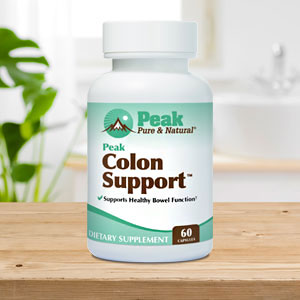Get Easy Health Digest™ in your inbox and don’t miss a thing when you subscribe today. Plus, get the free bonus report, Mother Nature’s Tips, Tricks and Remedies for Cholesterol, Blood Pressure & Blood Sugar as my way of saying welcome to the community!
How do you know if you have leaky gut?

How do you know if you have leaky gut syndrome?
Understanding some underlying causes of leaky gut can certainly help.
Something that may not be of help is relying on doctors and other medical professionals.
Since it’s an unrecognized diagnosable disease, doctors aren’t able to prescribe a drug or treatment for it since there’s no “single” cause. They may only be able to treat your symptoms.
And because leaky gut syndrome and its symptoms have vast connections to numerous medical conditions, you can see the amount of confusion that can generate.
That’s why most people suffering from leaky gut spend years trying to get to the root of their annoying and often miserable health issues.
But knowing the symptoms — as well as identifying conditions that can be tied to leaky gut — is a good starting point for you to nail down what’s going on with your health…
In this article, we are going to take a look at some common medical conditions, ranging from something as common as a headache or fatigue to something more chronic like autoimmune conditions, and what the latest research says about how these diseases are connected to leaky gut syndrome — and vice versa.
The symptoms of leaky gut
Researchers have identified specific symptoms and their connection to leaky gut.
- Digestive upset: Have excessive gas, bloating, diarrhea, stomach, or digestive pains? You could be suffering from irritable bowel disease (IBD). The journal Intestinal Research has shown that weak junctions in your intestinal lining or intestinal epithelium, just one part of your body’s system of protective barriers, are typically associated with increased intestinal permeability in people with IBD. The combination of increased permeability and decreased barrier protection amounts to a leaky gut.
- Food intolerances or sensitivities: If you notice yourself reacting to certain foods — dairy or gluten in particular — hours after your last meal, you could be dealing with a food sensitivity (not the same as a food allergy, which will be discussed below). Damage to the gut, including increased permeability can result from food sensitivities or intolerances.
- Achy or painful joints: Scientists are discovering that “wear and tear” isn’t the only reason your joints are hurting. New research is showing that loose junctions in your intestinal lining are playing a role in body wide inflammation that can increase joint pain problems.
- Chronic fatigue: If you’re feeling more tired than usual, don’t be so quick to blame it on your age or think it’s all in your head. Studies are showing how fatigue is linked to increasing levels of intestinal permeability.
- Eczema, acne and other skin issues: Do you apply the latest creams and cleansers to address your skin issues? Those remedies only go skin-deep. You need to look deeper and address the underlying source of your skin problems that starts in the gut. Scientists now confirm that leaky gut plays a role by allowing toxins and bacteria to travel through the body.
Conditions, disease and leaky gut
Once leaky gut sets in, you eventually become prone to a number of autoimmune diseases. Here’s are some conditions connected to leaky gut:
- Lupus: For a long time, the origin of this autoimmune disease, known for its butterfly rash, really stumped scientists. However, new research is showing lupus may have origins in the gut. One study found that those with lupus had reduced beneficial bacteria and an abundance of bad bacteria which contributed to higher levels of intestinal inflammation when compared to those who didn’t have lupus.
- Food allergies: Unlike food intolerances that cause pain because you’re missing the enzymes to break down your food, or food sensitivities that you notice only hours after you’ve eaten, food allergies can cause anaphylaxes, a life-threatening allergic reaction. This is in part due to food particles “leaking” through the gut into the bloodstream.
- Rheumatoid arthritis: What was believed to be genetic is now getting a second look-over thanks to the latest research out of the Mayo Clinic. Studies show that a leaky gut disrupts homeostasis in the microbiome (bacteria in the gut), allowing bad bacteria to escape into your bloodstream, alerting your immune system of the intruder and attacking your joints in the process.
- Fibromyalgia: Researchers are still in the dark about this disease’s origins. While they point to intense bouts of both mental or physical stress as the cause, new evidence suggests due to the excess toxins escaping through a leaky gut, your immune system is activated and attacks you, making you feel fatigued, weak, sore, forgetful and more.
- Thyroid diseases: The most common thyroid diseases, Hashimoto’s thyroiditis, and Graves’ Disease, co-occur with those who have damaged or “increased” intestinal permeability, eventually leading to the body attacking itself, in this specific case, the thyroid being attacked.
Relief starts with healing
In reading through the list of symptoms that can help you determine if you may suffer from a leaky gut, I’m sure you noticed a consistent theme: weakened or loose junctions and damage to the intestinal lining, which is quite literally a leaking gut.
Your intestinal epithelium (gut lining) is a protective mucosal barrier that research is only beginning to understand. Along with other epithelial barriers in other parts of your body, the breakdown of this protective system has been linked in the past 20 years to 2 billion chronic, non-infectious diseases which are believed to be triggered by distant inflammatory responses in the gut’s microbiome.
That means to heal from leaky gut and all of its effects, you must start with healing the epithelium, with tightening the junctures, reducing the inflammation and balancing the microbiome.
Here are steps you can start taking today to start that road to recovery:
- Probiotics: One of the quickest ways to begin the healing process of your epithelium is by rebalancing your microbiome with beneficial bacteria. Probiotics help to restore your gut flora, which creates a healthier gut environment. It can also help to ease digestion discomfort while reducing inflammation.
- Cut the fat: Diets high in saturated fat (butter, lard, coconut and palm oil, fatty meats like sausage and bacon) contribute to inflammation in your intestinal tract, damaging your gut lining and increasing permeability. Monounsaturated fats on the other hand have shown to be less inflammatory while improving overall health. Monosaturated fat sources include healthy oils like olive, soybean, sesame, sunflower and safflower, avocados, almonds, cashews and peanuts.
- Dump the dairy: Study after study shows that dairy is a disaster for your digestion because of the inflammation it causes to the epithelial cells lining your gut wall. Consider plant-based milk products that are less inflammatory.
- Avoid gluten: Gluten can make you miserable if you are sensitive to it and dangerously ill if you have celiac disease. Doctors tend to only recognize that gluten is associated with celiac. But research in 2020 at Columbia University Medical Center conclusively linked gluten sensitivity, leaky gut and systemic inflammation. Without mincing words, the study provided biological evidence of increased intestinal permeability in people who have non-celiac wheat sensitivity (NCWS). Substitute wheat for quinoa, brown rice, wild rice, buckwheat, millet, oats or corn.
- Work harder at clean living: It is suspected that our over-exposure to toxins, such as ozone, nanoparticles, microplastics, household cleaning agents, pesticides, enzymes, emulsifiers, fine dust, exhaust fumes, cigarette smoke and countless chemicals in the air, food and water contribute to leaky gut.
- Be aware of your transit time. Your bowel transit time is the amount of time waste sits inside your colon. The longer it sits there, like when you’re constipated, allows pathogens and chemicals to seep into your gut lining, disrupting and damaging it and contributing to leaky gut.
Sources:
Mayo clinic inflammatory bowel disease Overview — Mayoclinic.org
Intestinal Permeability Regulation by Tight Junction: Implication on Inflammatory Bowel Diseases — Pubmed.org
Type 2 diabetes influences bacterial tissue compartmentalisation in human obesity — Nature.com
Gut microbiota’s effect on mental health: The gut-brain axis — Pubmed.org
Arthritis susceptibility and the Gut Microbiome — Pubmed.org
Chronic fatigue syndrome is in your gut, not your head – ScienceDaily.com
Thyroid-Gut-Axis: How Does the Microbiota Influence Thyroid Function? — Pubmed.org
Defective epithelial barriers linked to two billion chronic diseases — Science Daily















